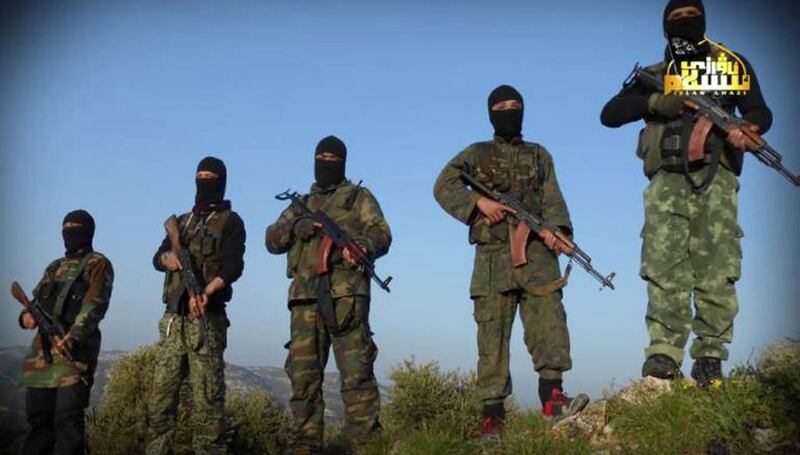BEIRUT // Many don’t speak Arabic and their role in Syria is little known to the outside world, but the Chinese fighters of the Turkistan Islamic Party in Syria are organised, battled-hardened and have been instrumental in ground offensives against president Bashar Al Assad’s forces in the country’s northern regions.
Thousands of Chinese militants have come to Syria since the country’s war began in March 2011 to fight against government forces and their allies. Some have joined Jabhat Fatah Al Sham, the group that was known as Jabhat Al Nusra before it announced it was separating from Al Qaeda. Others paid allegiance to ISIL and a smaller number joined factions such as the ultraconservative Ahrar Al Sham.
But the majority of Chinese extremists are with the Turkistan Islamic Party in Syria, whose vast majority are Chinese Muslims, particularly those from the Turkic-speaking Uighur majority native to China’s Xinjiang region. Their growing role in Syria has resulted in increased cooperation between Syrian and Chinese intelligence agencies who fear those same militants could one day return home and cause trouble there.
The Turkistan Islamic Party is the other name for the East Turkistan Islamic Movement that considers China’s Xinjiang to be East Turkistan.
Like most extremist groups in Syria, its aim is to remove Mr Al Assad’s secular government from power and replace it with strict Islamic rule. But unlike other extremist and opposition groups in Syria, it is a very secretive organisation whose members live among themselves, according to activists in northern Syria. They operate in parts of Idlib province in Syria’s north-west and in Jisr Al Shughour, a strategic town on the edge of Latakia province in Syria’s west, Mr Al Assad’s main stronghold. They are also active in Latakia province’s Kurdish Mountains of Latakia province.
Abdul-Hakim Ramadan, a doctor who was active in Idlib province, says that unlike other foreign fighters who have come to Syria, the Chinese have not merged into local communities and the language has been a major barrier.
Despite this, however, Abu Dardaa Al Shami, a member of the now-defunct extremist Jund Al Aqsa group, says the Turkistan Islamic Party has the best “Inghemasiyoun”, Arabic for “those who immerse themselves”. The Inghemasiyoun have been used by extremist groups such as ISIL and Jabhat Fatah Al Sham. Their role is to infiltrate their targets, unleash mayhem and fight to the death before a major ground offensive begins.
“They are the lions of ground offensives,” says Mr Al Shami, who fought on several occasions alongside Turkistan Islamic Party fighters in northern Syria.
The Chinese extremists’ participation in the war, which has killed nearly 400,000 people dead, comes at a time when Beijing is one of Mr Al Assad’s strongest international backers. Along with Russia, China has used its veto power at the United Nations Security Council on several occasions to prevent the imposition of international sanctions against its Arab ally.
Xie Xiaoyuan, China’s envoy to Syria, said in November that the two countries have had normal military exchanges focused on humanitarian issues, although Chinese officials have repeatedly rejected the possibility of sending troops or weapons.
In the last year, however, Chinese and Syrian officials have begun holding regular, once-a-month high-level meetings to share intelligence on militant movements in Syria, according to a person familiar with the matter.
“These people not only fight alongside international terrorist forces in Syria, but also they will possibly return to China posing threat to China’s national security,” says Li Wei, a terrorism expert at China Institutes of Contemporary International Relations and the director of the CICIR Institute of Security and Arms Control Studies.
Rami Abdul Rahman who heads the Syrian Observatory for Human Rights, a Britain-based monitoring group, says there are about 5,000 Chinese fighters in Syria, most of them with Turkistan Islamic Party fighters in northern Syria who along with their families make about 20,000. Mr Li says Mr Abdul Rahman’s numbers are far too high, however, adding that he believes there are about 300 Chinese fighters in Syria who brought with them about 700 family members.
“As the control of the passage along the borders between Turkey and Syria is being tightened, it is becoming more difficult for them to smuggle into Syria,” he says.
Syrian opposition activists and pro-government media outlets say dozens of Turkistan Islamic Party fighters have carried out suicide attacks against Syrian government forces and their allies and for the past two years have led battles mostly in the north of the country.
In 2015, members of the group spearheaded an attack on the northwestern province of Idlib and captured the town of Jisr Al Shughour. They reportedly damaged a church in the town and raised their black flag on top of it.
In late 2016, the Turkistan Islamic Party was also one of the main forces to briefly break a government siege on the then rebel-held east of Aleppo.
Mr Al Assad spoke about the role of Chinese extremist fighters in the Syrian war last month in an interview with Chinese PHOENIX TV, saying: “They know your country more than the others, so they can do more harm in your country than others.”
* Associated Press





